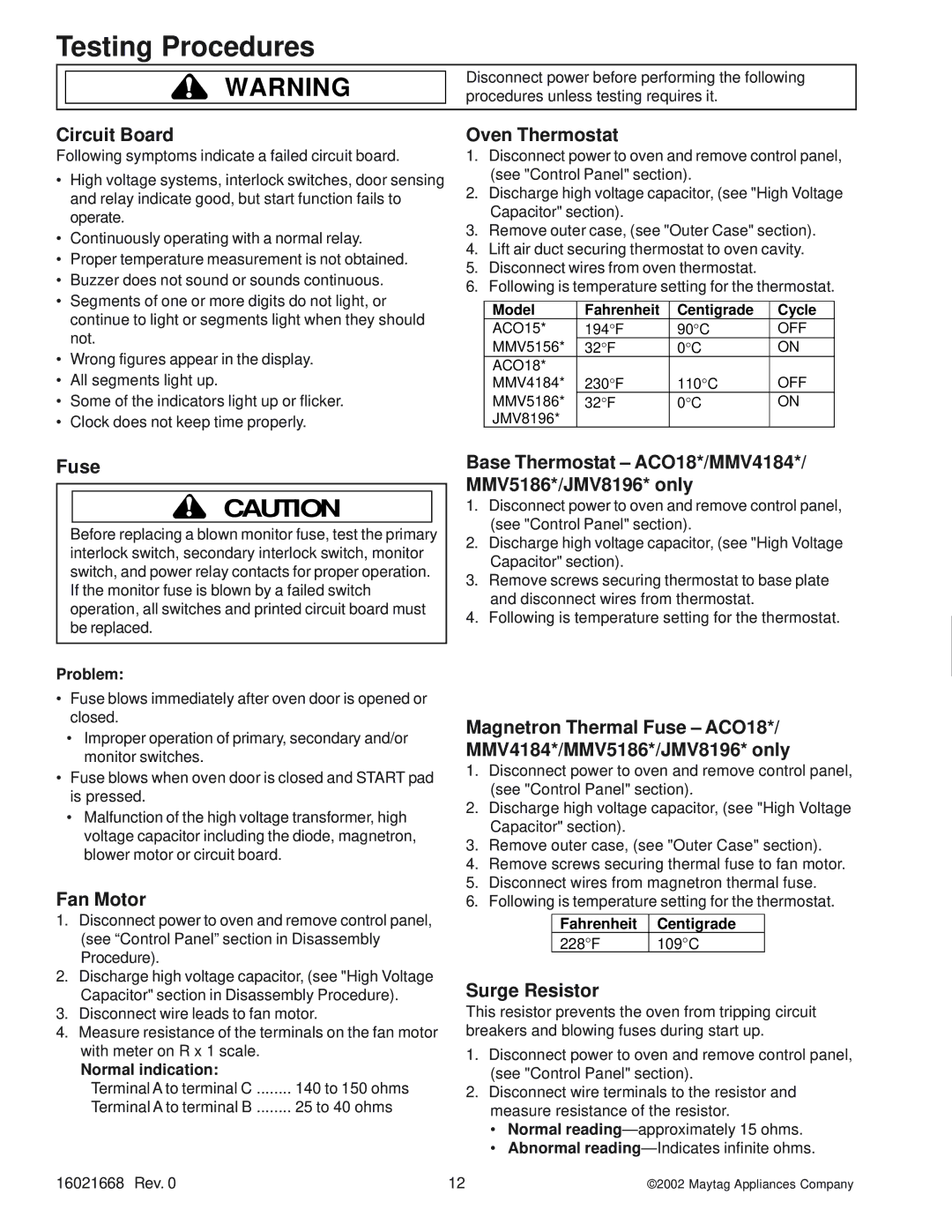
Testing Procedures
!WARNING
Disconnect power before performing the following procedures unless testing requires it.
Circuit Board
Following symptoms indicate a failed circuit board.
•High voltage systems, interlock switches, door sensing and relay indicate good, but start function fails to operate.
•Continuously operating with a normal relay.
•Proper temperature measurement is not obtained.
•Buzzer does not sound or sounds continuous.
•Segments of one or more digits do not light, or continue to light or segments light when they should not.
•Wrong figures appear in the display.
•All segments light up.
•Some of the indicators light up or flicker.
•Clock does not keep time properly.
Oven Thermostat
1.Disconnect power to oven and remove control panel, (see "Control Panel" section).
2.Discharge high voltage capacitor, (see "High Voltage Capacitor" section).
3.Remove outer case, (see "Outer Case" section).
4.Lift air duct securing thermostat to oven cavity.
5.Disconnect wires from oven thermostat.
6.Following is temperature setting for the thermostat.
Model | Fahrenheit | Centigrade | Cycle |
ACO15* | 194°F | 90°C | OFF |
MMV5156* | 32°F | 0°C | ON |
ACO18* |
|
|
|
MMV4184* | 230°F | 110°C | OFF |
MMV5186* | 32°F | 0°C | ON |
JMV8196* |
|
|
|
Fuse
!CAUTION
Before replacing a blown monitor fuse, test the primary interlock switch, secondary interlock switch, monitor switch, and power relay contacts for proper operation. If the monitor fuse is blown by a failed switch operation, all switches and printed circuit board must be replaced.
Problem:
•Fuse blows immediately after oven door is opened or closed.
•Improper operation of primary, secondary and/or monitor switches.
•Fuse blows when oven door is closed and START pad is pressed.
•Malfunction of the high voltage transformer, high voltage capacitor including the diode, magnetron, blower motor or circuit board.
Fan Motor
1.Disconnect power to oven and remove control panel, (see “Control Panel” section in Disassembly Procedure).
2.Discharge high voltage capacitor, (see "High Voltage Capacitor" section in Disassembly Procedure).
3.Disconnect wire leads to fan motor.
4.Measure resistance of the terminals on the fan motor with meter on R x 1 scale.
Normal indication:
Terminal A to terminal C ........ 140 to 150 ohms Terminal A to terminal B ........ 25 to 40 ohms
Base Thermostat – ACO18*/MMV4184*/ MMV5186*/JMV8196* only
1.Disconnect power to oven and remove control panel, (see "Control Panel" section).
2.Discharge high voltage capacitor, (see "High Voltage Capacitor" section).
3.Remove screws securing thermostat to base plate and disconnect wires from thermostat.
4.Following is temperature setting for the thermostat.
Magnetron Thermal Fuse – ACO18*/ MMV4184*/MMV5186*/JMV8196* only
1.Disconnect power to oven and remove control panel, (see "Control Panel" section).
2.Discharge high voltage capacitor, (see "High Voltage Capacitor" section).
3.Remove outer case, (see "Outer Case" section).
4.Remove screws securing thermal fuse to fan motor.
5.Disconnect wires from magnetron thermal fuse.
6.Following is temperature setting for the thermostat.
Fahrenheit Centigrade
228°F 109°C
Surge Resistor
This resistor prevents the oven from tripping circuit breakers and blowing fuses during start up.
1.Disconnect power to oven and remove control panel, (see "Control Panel" section).
2.Disconnect wire terminals to the resistor and measure resistance of the resistor.
•Normal
•Abnormal
16021668 Rev. 0 | 12 | ©2002 Maytag Appliances Company |
